Connect With Us
Blog
Items filtered by date: January 2017
Athlete's Foot a Problem at Gyms
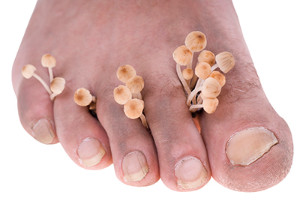 Anyone that has ever had athlete’s foot knows how much of a nuisance it is. It itches and itches and no amount of scratching will make it relent. The foot gets red, and pain can quickly ensue. Athlete’s foot is a fungus, and like most fungi, thrives in warm, moist environments. The gym is a perfect place for this fungus, so it is important to remember to wear sandals when showering after your workout. Keep your feet dry, make sure to clean them well, and change your socks daily. If your feet are prone to sweating you may have an increased risk of athlete’s foot, so double your efforts in this regard. If you do contract the disease, over the counter treatment options are available, and are quite effective.
Anyone that has ever had athlete’s foot knows how much of a nuisance it is. It itches and itches and no amount of scratching will make it relent. The foot gets red, and pain can quickly ensue. Athlete’s foot is a fungus, and like most fungi, thrives in warm, moist environments. The gym is a perfect place for this fungus, so it is important to remember to wear sandals when showering after your workout. Keep your feet dry, make sure to clean them well, and change your socks daily. If your feet are prone to sweating you may have an increased risk of athlete’s foot, so double your efforts in this regard. If you do contract the disease, over the counter treatment options are available, and are quite effective.
Athlete’s foot is an inconvenient condition that can be easily reduced with the proper treatment. If you have any concerns about your feet and ankles, contact one of our podiatrists from Advanced Care Podiatry. Our doctors will treat your foot and ankle needs.
Athlete’s Foot: The Sole Story
Athlete's foot, also known as tinea pedis, can be an extremely contagious foot infection. It is commonly contracted in public changing areas and bathrooms, dormitory style living quarters, around locker rooms and public swimming pools, or anywhere your feet often come into contact with other people.
Solutions to Combat Athlete’s Foot
- Hydrate your feet by using lotion
- Exfoliate
- Buff off nails
- Use of anti-fungal products
- Examine your feet and visit your doctor if any suspicious blisters or cuts develop
Athlete’s foot can cause many irritating symptoms such as dry and flaking skin, itching, and redness. Some more severe symptoms can include bleeding and cracked skin, intense itching and burning, and even pain when walking. In the worst cases, Athlete’s foot can cause blistering as well. Speak to your podiatrist for a better understanding of the different causes of Athlete’s foot, as well as help in determining which treatment options are best for you.
If you have any questions please feel free to contact one of our offices located in Bensalem, Pennsylvania, Port Richmond, Philadelphia, and Hamilton, New Jersey . We offer the newest diagnostic and treatment technologies for all your foot and ankle needs.
Read more about Athlete's FootAthlete's Foot a Problem at Gyms
 Anyone that has ever had athlete’s foot knows how much of a nuisance it is. It itches and itches and no amount of scratching will make it relent. The foot gets red, and pain can quickly ensue. Athlete’s foot is a fungus, and like most fungi, thrives in warm, moist environments. The gym is a perfect place for this fungus, so it is important to remember to wear sandals when showering after your workout. Keep your feet dry, make sure to clean them well, and change your socks daily. If your feet are prone to sweating you may have an increased risk of athlete’s foot, so double your efforts in this regard. If you do contract the disease, over the counter treatment options are available, and are quite effective.
Anyone that has ever had athlete’s foot knows how much of a nuisance it is. It itches and itches and no amount of scratching will make it relent. The foot gets red, and pain can quickly ensue. Athlete’s foot is a fungus, and like most fungi, thrives in warm, moist environments. The gym is a perfect place for this fungus, so it is important to remember to wear sandals when showering after your workout. Keep your feet dry, make sure to clean them well, and change your socks daily. If your feet are prone to sweating you may have an increased risk of athlete’s foot, so double your efforts in this regard. If you do contract the disease, over the counter treatment options are available, and are quite effective.
Athlete’s foot is an inconvenient condition that can be easily reduced with the proper treatment. If you have any concerns about your feet and ankles, contact one of our podiatrists from Pennsylvania Foot & Ankle. Our doctors will treat your foot and ankle needs.
Athlete’s Foot: The Sole Story
Athlete's foot, also known as tinea pedis, can be an extremely contagious foot infection. It is commonly contracted in public changing areas and bathrooms, dormitory style living quarters, around locker rooms and public swimming pools, or anywhere your feet often come into contact with other people.
Solutions to Combat Athlete’s Foot
- Hydrate your feet by using lotion
- Exfoliate
- Buff off nails
- Use of anti-fungal products
- Examine your feet and visit your doctor if any suspicious blisters or cuts develop
Athlete’s foot can cause many irritating symptoms such as dry and flaking skin, itching, and redness. Some more severe symptoms can include bleeding and cracked skin, intense itching and burning, and even pain when walking. In the worst cases, Athlete’s foot can cause blistering as well. Speak to your podiatrist for a better understanding of the different causes of Athlete’s foot, as well as help in determining which treatment options are best for you.
If you have any questions please feel free to contact one of our offices located in Bensalem, Pennsylvania, Port Richmond, Philadelphia, and Hamilton, New Jersey . We offer the newest diagnostic and treatment technologies for all your foot and ankle needs.
Reducing Inflammation in Arthritic Feet
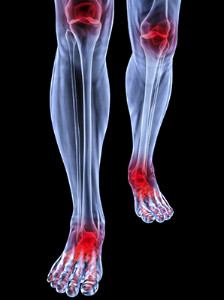 Arthritis is a very common disease that can affect joints in areas all over the body. Arthritis of the feet can be especially painful and debilitating due to the constant weight put on that section of the body. For someone with arthritic feet, every step taken can be excruciating. There are many different types of arthritis, though inflammatory arthritis can be one of the most devastating. Rheumatoid arthritis is one such type, where the cartilage of the joints is being destroyed. Though there is really no set diet to cure this illness, there are some recommended foods that may prove effective in helping mitigate some of the arthritic symptoms. The key is to reduce inflammation. Certain foods that help do just that are nuts, fish, and, dark vegetables.
Arthritis is a very common disease that can affect joints in areas all over the body. Arthritis of the feet can be especially painful and debilitating due to the constant weight put on that section of the body. For someone with arthritic feet, every step taken can be excruciating. There are many different types of arthritis, though inflammatory arthritis can be one of the most devastating. Rheumatoid arthritis is one such type, where the cartilage of the joints is being destroyed. Though there is really no set diet to cure this illness, there are some recommended foods that may prove effective in helping mitigate some of the arthritic symptoms. The key is to reduce inflammation. Certain foods that help do just that are nuts, fish, and, dark vegetables.
Arthritis can be a difficult condition to live with. If you are seeking treatment, contact one of our podiatrists from Advanced Care Podiatry. Our doctors can provide the care you need to keep you pain-free and on your feet.
Arthritic Foot Care
Arthritis is a joint disorder that involves the inflammation of different joints in your body, such as those in your feet. Arthritis is often caused by a degenerative joint disease and causes mild to severe pain in all affected areas. In addition to this, swelling and stiffness in the affected joints can also be a common symptom of arthritis.
In many cases, wearing ill-fitting shoes can worsen the effects and pain of arthritis. Wearing shoes that have a lower heel and extra room can help your feet feel more comfortable. In cases of rheumatoid arthritis, the arch in your foot may become problematic. Buying shoes with proper arch support that contour to your feet can help immensely.
Alleviating Arthritic Pain
- Exercises that stretch the foot can prevent further pain and injury and increase mobility
- Most of the pain can be alleviated with anti-inflammatory drugs, heat, and topical medications
- Massages can help temporarily alleviate pain.
It is best to see your doctor for the treatment that is right for your needs and symptoms. Conditions vary, and a podiatrist can help you determine the right method of care for your feet.
If you have any questions, please feel free to contact one of our offices located in Bensalem, Pennsylvania, Port Richmond, Philadelphia, and Hamilton, New Jersey . We offer the newest diagnostic tools and technology to treat your foot and ankle needs.
Read more about Arthritic Foot CareReducing Inflammation in Arthritic Feet
 Arthritis is a very common disease that can affect joints in areas all over the body. Arthritis of the feet can be especially painful and debilitating due to the constant weight put on that section of the body. For someone with arthritic feet, every step taken can be excruciating. There are many different types of arthritis, though inflammatory arthritis can be one of the most devastating. Rheumatoid arthritis is one such type, where the cartilage of the joints is being destroyed. Though there is really no set diet to cure this illness, there are some recommended foods that may prove effective in helping mitigate some of the arthritic symptoms. The key is to reduce inflammation. Certain foods that help do just that are nuts, fish, and, dark vegetables.
Arthritis is a very common disease that can affect joints in areas all over the body. Arthritis of the feet can be especially painful and debilitating due to the constant weight put on that section of the body. For someone with arthritic feet, every step taken can be excruciating. There are many different types of arthritis, though inflammatory arthritis can be one of the most devastating. Rheumatoid arthritis is one such type, where the cartilage of the joints is being destroyed. Though there is really no set diet to cure this illness, there are some recommended foods that may prove effective in helping mitigate some of the arthritic symptoms. The key is to reduce inflammation. Certain foods that help do just that are nuts, fish, and, dark vegetables.
Arthritis can be a difficult condition to live with. If you are seeking treatment, contact one of our podiatrists from Pennsylvania Foot & Ankle. Our doctors can provide the care you need to keep you pain-free and on your feet.
Arthritic Foot Care
Arthritis is a joint disorder that involves the inflammation of different joints in your body, such as those in your feet. Arthritis is often caused by a degenerative joint disease and causes mild to severe pain in all affected areas. In addition to this, swelling and stiffness in the affected joints can also be a common symptom of arthritis.
In many cases, wearing ill-fitting shoes can worsen the effects and pain of arthritis. Wearing shoes that have a lower heel and extra room can help your feet feel more comfortable. In cases of rheumatoid arthritis, the arch in your foot may become problematic. Buying shoes with proper arch support that contour to your feet can help immensely.
Alleviating Arthritic Pain
- Exercises that stretch the foot can prevent further pain and injury and increase mobility
- Most of the pain can be alleviated with anti-inflammatory drugs, heat, and topical medications
- Massages can help temporarily alleviate pain.
It is best to see your doctor for the treatment that is right for your needs and symptoms. Conditions vary, and a podiatrist can help you determine the right method of care for your feet.
If you have any questions, please feel free to contact one of our offices located in Bensalem, Pennsylvania, Port Richmond, Philadelphia, and Hamilton, New Jersey . We offer the newest diagnostic tools and technology to treat your foot and ankle needs.
The Effects of Wearing Shoes too Small
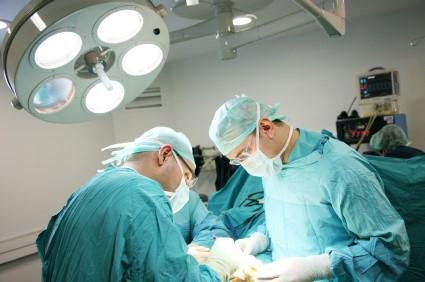 In a recent study focusing on the effects of shoes on women’s feet, 88% of the women included were wearing shoes that were too small for their feet. 356 women were included in the study. Most of the women had not re-measured their feet in over ten years, and over 50% stated that they experienced daily foot pain from their shoes. Wearing shoes that are too tight can make way for the development of foot conditions such as bunions, hammertoes, corns, and calluses, and can even result in surgery for the treatment or removal of such conditions. Surgery is often seen as the final option for the treatment of many of these conditions; to lessen the possibility of surgery and the development of these conditions in general, always wear shoes of the proper size.
In a recent study focusing on the effects of shoes on women’s feet, 88% of the women included were wearing shoes that were too small for their feet. 356 women were included in the study. Most of the women had not re-measured their feet in over ten years, and over 50% stated that they experienced daily foot pain from their shoes. Wearing shoes that are too tight can make way for the development of foot conditions such as bunions, hammertoes, corns, and calluses, and can even result in surgery for the treatment or removal of such conditions. Surgery is often seen as the final option for the treatment of many of these conditions; to lessen the possibility of surgery and the development of these conditions in general, always wear shoes of the proper size.
Foot surgery is sometimes necessary to fix a foot ailment. To learn more, contact one of our podiatrists from Advanced Care Podiatry. Our podiatrists will assist you with all of your foot and ankle needs.
When Is Surgery Necessary?
Foot and ankle surgery is generally reserved for cases in which less invasive, conservative procedures have failed to help with the problem. Some of the cases in which surgery may be necessary are:
- Removing foot deformities like bone spurs and bunions
- Severe arthritis that has caused bone issues
- Cosmetic reconstruction
What Types of Surgery Are There?
The type of surgery you receive will depend on the nature of the problem you have. Some of the possible surgeries include:
- Bunionectomy for painful bunions
- Surgical fusion for realignment of bones
- Neuropathy decompression surgery to treat nerve damage
Benefits of Surgery
Although surgery is usually a last resort, it can provide more complete pain relief compared to non-surgical methods and may allow you to finally resume full activity.
Surgical techniques have also become increasingly sophisticated. Techniques like endoscopic surgery allow for smaller incisions and faster recovery times.
If you have any questions please feel free to contact our offices located in New Jersey and Pennsylvania. We offer the newest diagnostic and treatment technologies for all your foot and ankle needs.
Fat Pad Atrophy Studies Lead to New Treatment
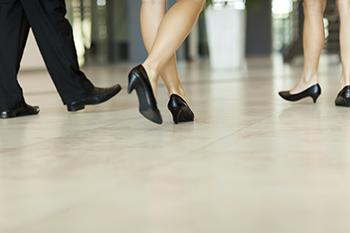 A breakthrough in treating foot pain is beginning to get attention, particularly in Pittsburgh, Pennsylvania. Doctors at the University of Pittsburgh Medical Center have been studying fat pad atrophy, which is when people lose the fat on the balls or heels of their feet. When bones no longer have the cushioning they need, they become bruised and inflamed. Husband and wife team Doctors Jeff and Beth Gusenoff have created a procedure called foot grafting, similar to liposuction, where fat removed from other parts of the body is injected into the bottoms of the feet. Patients are able to walk immediately after the procedure.
A breakthrough in treating foot pain is beginning to get attention, particularly in Pittsburgh, Pennsylvania. Doctors at the University of Pittsburgh Medical Center have been studying fat pad atrophy, which is when people lose the fat on the balls or heels of their feet. When bones no longer have the cushioning they need, they become bruised and inflamed. Husband and wife team Doctors Jeff and Beth Gusenoff have created a procedure called foot grafting, similar to liposuction, where fat removed from other parts of the body is injected into the bottoms of the feet. Patients are able to walk immediately after the procedure.
When dealing with systemic disease of the feet, is extremely important to check the affected areas routinely so that any additional problems are caught quickly. If you have any concerns about your feet and ankles contact one of our podiatrists from Advanced Care Podiatry. Our podiatrists will assist you with all of your foot and ankle needs.
Systemic Diseases of the Feet
Systemic diseases affect the whole body, and symptoms usually are displayed in the feet. This condition can make a patient’s ability to walk unbearable. Systemic diseases include gout, diabetes mellitus, neurological disorders, and arthritis.
Gout – is caused by an excess of uric acid in the body. Common symptoms include pain, inflammation, and redness at the metatarsal/phalangeal joint of the base big toe. Gout can be treated by NSAIDs to relieve pain and inflammation, and other drugs that lower the acid levels in the body.
Diabetes mellitus – is an increase in the level of blood sugar that the body cannot counteract with its own insulin. Failure to produce enough insulin is a factor in Diabetes.
Diabetes of the Feet
Diabetic Neuropathy – may lead to damaged nerves and affect the feet through numbness and loss of sensation.
Peripheral Vascular Disease – can restrict the blood flow to the feet, and often times lead to amputation of the feet.
If you have any questions please feel free to contact our office located in New Jersey and Pennsylvania. We offer the newest diagnostic and treatment technologies for all your foot and ankle needs.
Understanding Rheumatoid Arthritis
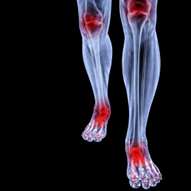 Rheumatoid arthritis is known as “one of the most common autoimmune diseases in America,” affecting women more often than men. The disease is known for causing pain and swelling symptoms in the body’s joints, as the immune system begins attacking tissues in the joints. Other symptoms include stiffness, fever, fatigue, and impacted mobility. Recent research suggests that removing certain foods from your diet and adding in others can help fight against inflammation symptoms. Avoid foods high in gluten, dairy and eggs. Opt for foods with Omega-3 fatty acids, Vitamin K2, Vitamin D, and calcium.
Rheumatoid arthritis is known as “one of the most common autoimmune diseases in America,” affecting women more often than men. The disease is known for causing pain and swelling symptoms in the body’s joints, as the immune system begins attacking tissues in the joints. Other symptoms include stiffness, fever, fatigue, and impacted mobility. Recent research suggests that removing certain foods from your diet and adding in others can help fight against inflammation symptoms. Avoid foods high in gluten, dairy and eggs. Opt for foods with Omega-3 fatty acids, Vitamin K2, Vitamin D, and calcium.
Because RA affects more than just your joints, including the joints in your feet and ankles, it is important to seek early diagnosis from your podiatrist if you feel like the pain in your feet might be caused by RA. For more information, contact one of our podiatrists of Advanced Care Podiatry. Our podiatrists will treat your foot and ankle needs.
What Is Rheumatoid Arthritis?
Rheumatoid Arthritis (RA) is an autoimmune disorder in which the body’s own immune system attacks the membranes surrounding the joints. Inflammation of the lining and eventually the destruction of the joint’s cartilage and bone occur, causing severe pain and immobility.
Rheumatoid Arthritis of the Feet
Although RA usually attacks multiple bones and joints throughout the entire body, almost 90 percent of cases result in pain in the foot or ankle area.
Symptoms
- Swelling & pain in the feet
- Stiffness in the feet
- Pain on the ball or sole of feet
- Joint shift and deformation
Diagnosis
Quick diagnosis of RA in the feet is important so that the podiatrist can treat the area effectively. Your doctor will ask you about your medical history, occupation, and lifestyle to determine the origin of the condition. Rheumatoid Factor tests help to determine if someone is affected by the disease.
If you have any questions please feel free to contact our offices located in New Jersey and Pennsylvania. We offer the newest diagnostic tools and technology to treat your foot and ankle needs.
Blog Archives
- April 2024
- March 2024
- February 2024
- January 2024
- December 2023
- November 2023
- October 2023
- September 2023
- August 2023
- July 2023
- June 2023
- May 2023
- April 2023
- March 2023
- February 2023
- January 2023
- December 2022
- November 2022
- October 2022
- September 2022
- August 2022
- July 2022
- June 2022
- May 2022
- April 2022
- March 2022
- February 2022
- January 2022
- December 2021
- November 2021
- October 2021
- September 2021
- August 2021
- July 2021
- June 2021
- May 2021
- April 2021
- March 2021
- February 2021
- January 2021
- December 2020
- November 2020
- October 2020
- September 2020
- August 2020
- July 2020
- June 2020
- May 2020
- April 2020
- March 2020
- February 2020
- January 2020
- December 2019
- November 2019
- October 2019
- September 2019
- August 2019
- July 2019
- June 2019
- May 2019
- April 2019
- March 2019
- February 2019
- January 2019
- December 2018
- November 2018
- October 2018
- September 2018
- August 2018
- July 2018
- June 2018
- May 2018
- April 2018
- March 2018
- February 2018
- January 2018
- December 2017
- November 2017
- October 2017
- September 2017
- August 2017
- July 2017
- June 2017
- May 2017
- April 2017
- March 2017
- February 2017
- January 2017
- December 2016
- November 2016
